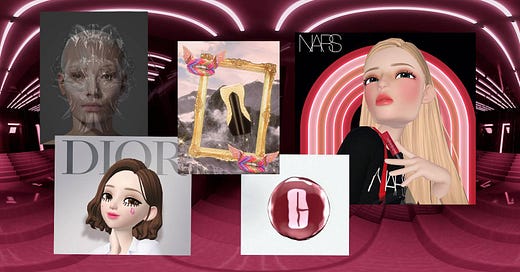Fashion and Beauty Brands Make Their Marks in the Metaverse
From Gucci Town to MetaBirkins, here's why you may not be wearing your next purchase.
Photo Credit: Business of Fashion
Thinking about where to buy your next lipstick, sneakers or handbag?
Try the metaverse. You might not be wearing your next piece, but you will notice its virtual value.
According to the Vogue Business article “Beyond the Bubble: Making NFTs Work for Fashion,” buyers want to show off their purchase without damaging the item and are investing in virtual pieces rather than wearing real ones.
However, if you still want to wear the pieces, you can purchase “wearable NFTs.” These refer to real, limited-edition products that model the digital product. One example of this are sneakers made by the NFT-first brand RTFKT, which has already sold $4.5 million of digital products this year.
Photo Credit: RTFKT via Vogue Business
The Vogue Business article also discusses the challenges fashion brands face in the metaverse. This spans from their lack of a crypto audience to how anyone can mint an NFT. Digitally native fashion houses without physical storefronts tend to excel more with NFTs.
One of these challenges highlights a lawsuit from earlier this year, in which Hermes sued a digital artist for minting MetaBirkins, NFT knockoffs of the Hermes Birkin Handbag. The main debate was about trademark infringement versus expressive art, and the results will serve as a preview for fashion and art in the metaverse future.
Photo Credit: Modcanyon
Beyond selling NFTs in the metaverse, brands aim to build communities. Gucci Town is a virtual piazza on Roblox that is creating immersive experiences for everyone.
According to the Women’s Wear Daily article “Gucci Town Arrives on Roblox,” Gucci Town held a two week event, Gucci Garden, in which visitors were able to wander around a virtual version of the brand’s Archetypes exhibition in Florence.
Gucci’s progress in the metaverse and cryptocurrency is also explained in the Business of Fashion article “Gucci to Accept Cryptocurrency,” which states “Gucci will accept 10 crypto currencies including Bitcoin, Ethereum and Dogecoin alongside five stablecoins pegged to the USD.”
Photo Credit: Women’s Wear Daily
Beauty brands have also begun building in the metaverse with the creation of NFTs, products for avatars, and virtual storefronts, experiences and games, according to the article “Beauty’s Place in the Metaverse” by the Business of Fashion. Some of these brands include Dior, Gucci, Clinique, Givenchy Parfums, Charlotte Tilbury and Nars.
These brands are placing high focus on rethinking how products appear online. An example in the article discusses an NFT created by Box and Estée Lauder, which accounted for the Advanced Night Repair product’s history and ingredients and resulted in a filter that coated owners’ avatars in a glowing radiant effect.
The possibilities for buying, selling and interacting with fashion and beauty brands in the metaverse are endless. Start dressing your avatars, because this is only the beginning.
Learn More:
The Vogue Business article “Beyond the Bubble: Making NFTs Work for Fashion.”
The MetaBirkin Trial.
The Women’s Wear Daily article “Gucci Town Arrives on Roblox.”
The Business of Fashion article “Gucci to Accept Cryptocurrency.”
The Business of Fashion article “Beauty’s Place in the Metaverse.”







